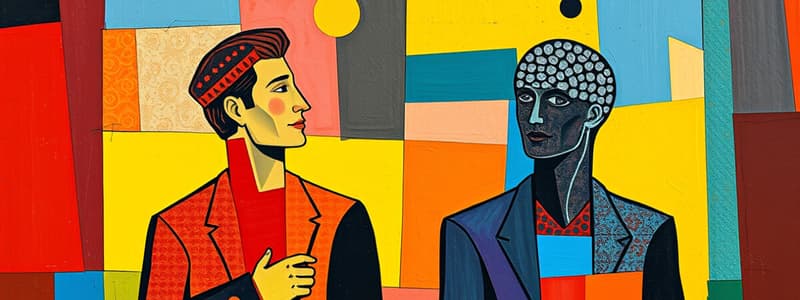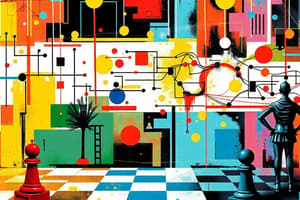Podcast
Questions and Answers
How does logic contribute to the concept of faith according to the text?
How does logic contribute to the concept of faith according to the text?
Logic can strengthen faith by providing reasonable arguments, though it cannot prove faith without dispelling the need for it.
What is the relationship between logic and wisdom in philosophy?
What is the relationship between logic and wisdom in philosophy?
Logic is a crucial instrument for philosophy, helping to cultivate wisdom.
According to the passage, why is studying logic important for democracy?
According to the passage, why is studying logic important for democracy?
Studying logic is vital for democracy as it helps citizens make reliable judgments and weigh arguments rationally.
What limitations of logic are mentioned in the text?
What limitations of logic are mentioned in the text?
How does the text differentiate between the contexts of Descartes' and a bumper sticker's argument?
How does the text differentiate between the contexts of Descartes' and a bumper sticker's argument?
What does the phrase 'I think, therefore I am' imply in the context of logical reasoning?
What does the phrase 'I think, therefore I am' imply in the context of logical reasoning?
In what ways can logic aid humans in their thinking processes?
In what ways can logic aid humans in their thinking processes?
Explain why principles of logic must be considered rigid, and how this rigidity impacts their application to changing situations.
Explain why principles of logic must be considered rigid, and how this rigidity impacts their application to changing situations.
Detail the roles of the first, second, and third acts of the mind in the pursuit of truth according to the content.
Detail the roles of the first, second, and third acts of the mind in the pursuit of truth according to the content.
Discuss the importance of truth as described in the content and its comparison to food for the mind.
Discuss the importance of truth as described in the content and its comparison to food for the mind.
Identify and briefly explain the three kinds of sciences as classified by Aristotle.
Identify and briefly explain the three kinds of sciences as classified by Aristotle.
What is meant by saying that logic helps us by demanding definitions and good reasoning?
What is meant by saying that logic helps us by demanding definitions and good reasoning?
Why do we rely on authorities according to the text?
Why do we rely on authorities according to the text?
What is the role of logic in relation to authority?
What is the role of logic in relation to authority?
What does it mean to 'test our authorities'?
What does it mean to 'test our authorities'?
What are some examples of authorities listed in the text?
What are some examples of authorities listed in the text?
What happens when authorities contradict each other?
What happens when authorities contradict each other?
Why is it considered 'foolish' not to question authorities?
Why is it considered 'foolish' not to question authorities?
What are the 'three acts of the mind' mentioned in the text?
What are the 'three acts of the mind' mentioned in the text?
How does the text define 'recognizing contradictions'?
How does the text define 'recognizing contradictions'?
What does the text imply about the certainty of knowledge?
What does the text imply about the certainty of knowledge?
Why is it important to have good reasons for believing authorities?
Why is it important to have good reasons for believing authorities?
Flashcards are hidden until you start studying
Study Notes
Logic and Wisdom
- Logic can support the establishment of wisdom through reasonable arguments, like classic philosophical debates around God’s existence.
- While logic does not replace faith, it can enhance it and contribute to true happiness, as truth is prioritized over mere happiness.
- Authentic happiness is tied to honesty and the pursuit of truth, even if it means letting go of comforting beliefs.
Philosophy
- Philosophy is defined as "the love of wisdom," which implies that logic is a fundamental tool in philosophical inquiry.
- Logic serves as an essential instrument for philosophy, akin to how telescopes aid astronomy and math supports physics.
Democracy
- The strength of democracy relies on the ability of citizens to make rational judgments and analyze arguments effectively.
- Reasoning is paramount in a democratic society where leadership is founded on persuasion rather than force, as emphasized by Thomas Jefferson.
Limits of Logic
- Logic has inherent limitations that necessitate broader cognitive approaches, including intuition and emotional intelligence.
- Logical reasoning is situated within a human context, laden with personal and emotional factors that affect interpretation and understanding.
- An example highlighting this distinction is Descartes' “I think, therefore I am,” contrasted with a modern, humorous interpretation revealing the significance of context in logic.
Authority and Logic
- Authority is important, but logic is crucial for assessing the validity of such authorities.
- Rigid principles of logic must be applied to effectively navigate the complexities of a dynamic world.
Truth
- Logic aids in the pursuit of truth, which is inherently valuable and should be sought for its own sake.
- The pursuit of truth involves defining terms and providing sound reasoning, as truth emerges in the act of judgment rather than mere understanding or reasoning.
- Truth nourishes the mind like food sustains the body, underscoring its importance in human cognition.
Aristotle's Scienfitic Categorization
- Aristotle identified three motives for pursuing truth, leading to three distinct types of sciences:
- Productive sciences: Focused on creating and improving the world.
- Practical sciences: Aim to apply knowledge for ethical decision-making.
- Theoretical sciences: Concerned with understanding fundamental principles and knowledge.
Studying That Suits You
Use AI to generate personalized quizzes and flashcards to suit your learning preferences.




